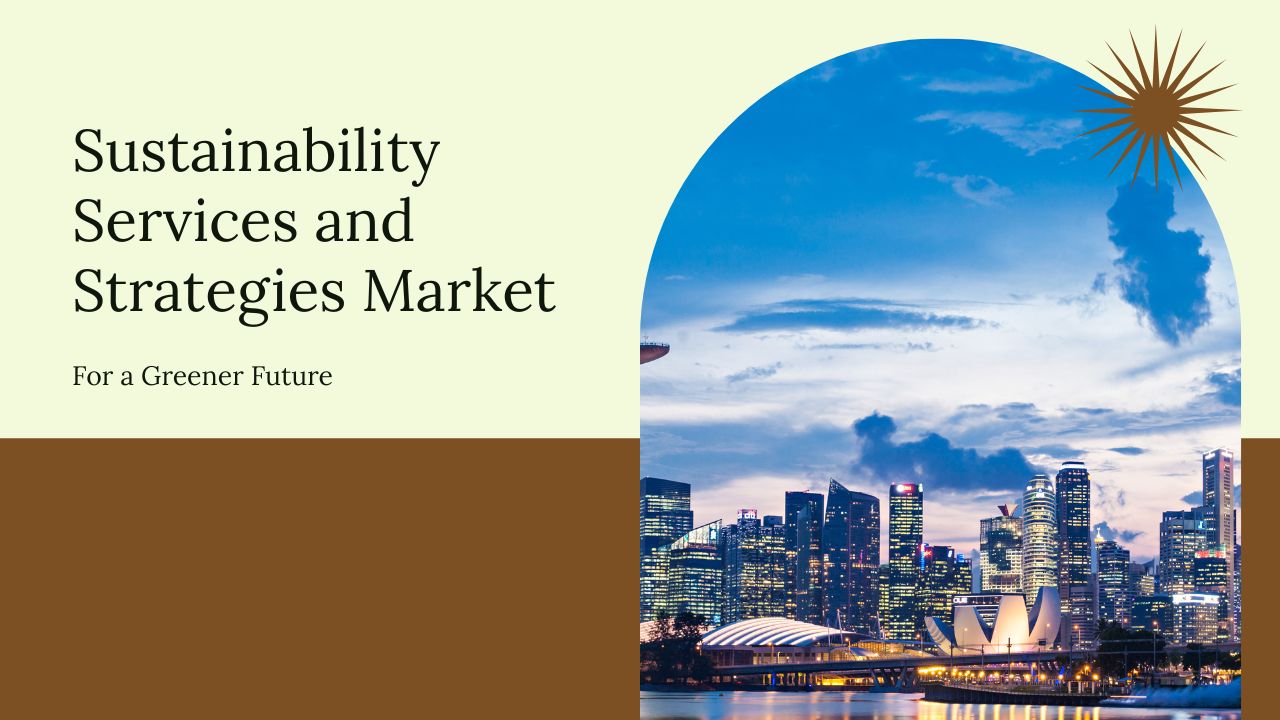
Market Overview
The Sustainability Services and Strategies Market is projected to grow from USD 16,990 million in 2024 to USD 107,796.88 million by 2032, with a remarkable compound annual growth rate (CAGR) of 25.98%. This impressive expansion underscores the urgency for organizations to transition toward environmentally and socially responsible models. As climate change intensifies and public pressure mounts, sustainability is no longer optional—it’s imperative.
Businesses worldwide are integrating sustainability into their strategic priorities. This includes carbon footprint reduction, sustainable supply chain design, ESG reporting, and waste minimization. The scope of services now ranges from consulting and auditing to full-scale implementation support. With governments enacting stricter compliance mandates and stakeholders demanding accountability, companies are turning to specialized partners to navigate complex sustainability landscapes.
In today’s business environment, the alignment between profitability and responsibility is becoming more evident. Stakeholders are rewarding companies that lead with purpose, and sustainability is becoming a competitive advantage. Whether it’s reducing emissions, increasing resource efficiency, or enhancing social equity, organizations that embed sustainability in their core operations are future-proofing their growth. The rapidly growing market for sustainability services is a testament to this transition and is set to shape the way industries operate over the next decade.
Download Sample Report: https://www.credenceresearch.com/report/sustainability-services-and-strategies-market
Market Drivers
Climate-Related Risk Management
Businesses are facing increasing physical and transitional climate risks—from extreme weather to shifting regulatory landscapes. These risks pose financial, reputational, and operational challenges. As a result, demand is surging for climate risk assessments, scenario modeling, and resilience planning. Consulting firms help identify vulnerabilities, create mitigation strategies, and align business models with a low-carbon future.
Investor Demand for ESG Transparency
Institutional investors are pushing companies to disclose their sustainability metrics. ESG integration is now a key consideration in investment decisions. Companies that lack transparency risk being excluded from portfolios. In response, organizations are investing in third-party services to improve data quality, audit ESG reports, and align disclosures with global standards, boosting trust and capital access.
Sustainable Supply Chain Pressure
Global supply chains are under intense scrutiny to reduce environmental and social impacts. From ethical sourcing to emission reduction, sustainability in procurement is a growing concern. Organizations are leveraging sustainability strategies to map, audit, and optimize supply chains. This trend is particularly strong in sectors such as retail, agriculture, and manufacturing.
Government Incentives and Green Finance
Many governments are offering incentives such as tax breaks, grants, and low-interest loans for sustainability initiatives. Green bonds and ESG-linked financing mechanisms are also expanding. Companies are capitalizing on these opportunities with the help of sustainability service providers who specialize in regulatory navigation, funding strategy, and green investment readiness.
Market Challenges
Lack of Standardized Frameworks
The absence of a unified global ESG framework leads to inconsistency in sustainability practices. Different regions and industries follow varying guidelines, making benchmarking and comparison difficult. This complexity increases implementation time and cost for businesses and service providers alike.
Technology Integration Gaps
While digital tools can enhance sustainability efforts, many companies struggle to integrate these solutions effectively. Legacy systems, incompatible data formats, and limited automation hinder real-time ESG monitoring and reporting. This reduces the efficiency of sustainability strategies and increases reliance on manual processes.
Unclear ROI for SMEs
Small and medium enterprises (SMEs) often find it challenging to justify the cost of sustainability strategies. With tight budgets and limited staff, demonstrating the financial return on investment becomes difficult. As a result, adoption rates among SMEs remain slower compared to large corporations.
Shortage of Skilled Professionals
There is a growing demand for sustainability professionals with multidisciplinary expertise in environmental science, data analytics, policy, and business strategy. However, the talent pool is limited. This talent gap places pressure on consulting firms and companies, delaying implementation and affecting service quality.
Market Opportunity
Corporate Transition to Net Positive Models
Beyond carbon neutrality, organizations are now aiming for “net positive” models that give back more than they take. This requires holistic assessments, lifecycle analysis, and stakeholder engagement—all areas where sustainability service providers can deliver high-value expertise and tools.
Urban Sustainability and Smart Cities
As urbanization accelerates, cities are becoming key hubs for sustainable transformation. Initiatives such as green buildings, smart infrastructure, and zero-waste zones are gaining traction. Service providers have an opportunity to work with municipalities, developers, and utilities to embed sustainability into city planning.
Decarbonization of Heavy Industries
Industries such as steel, cement, and oil & gas are among the highest emitters and face increasing pressure to decarbonize. The need for specialized support in emissions tracking, energy transition planning, and carbon offsetting offers high-value opportunities for niche service providers.
Scope 3 Emission Management
Companies are increasingly accountable for indirect emissions across their value chains (Scope 3). Tracking and managing these emissions requires data collection, stakeholder collaboration, and technological integration. Service providers that offer platforms or methodologies to address Scope 3 emissions will be in strong demand.
Market Segmentation
Based on Type
- Strategy and Planning
- Technical Support
- Testing, Auditing & Verification
- Sustainability Marketing
Based on Application
- Chemicals
- Building & Construction
- Agriculture, Food & Beverage
- Mining, Oil & Gas
Based on Region
North America
- U.S.
- Canada
- Mexico
Europe - UK
- France
- Germany
- Italy
- Spain
- Russia
- Belgium
- Netherlands
- Austria
- Sweden
- Poland
- Denmark
- Switzerland
- Rest of Europe
Asia Pacific - China
- Japan
- South Korea
- India
- Australia
- Thailand
- Indonesia
- Vietnam
- Malaysia
- Philippines
- Taiwan
- Rest of Asia Pacific
Latin America - Brazil
- Argentina
- Peru
- Chile
- Colombia
- Rest of Latin America
Middle East & Africa - GCC Countries
- South Africa
- Rest of the Middle East and Africa
Regional Analysis
North America
North America’s market is growing due to investor activism, ESG legislation, and carbon neutrality pledges. The U.S. leads with strong institutional investor pressure, while Canada and Mexico are advancing national climate policies. Local governments and businesses are investing in decarbonization and climate resilience.
Europe
Europe maintains a regulatory edge with the Corporate Sustainability Reporting Directive (CSRD) and the EU Taxonomy. Countries like France, Germany, and Sweden are pioneering green innovation and sustainable finance. The market here is mature, with strong demand for advanced verification and reporting solutions.
Asia Pacific
The Asia Pacific market is rapidly evolving. China’s green manufacturing push and India’s climate commitments are driving demand for strategic planning and sustainability audits. South Korea and Japan also exhibit strong activity in green technologies and smart infrastructure.
Latin America
Latin America’s market is growing steadily. Brazil and Colombia are focusing on sustainable agriculture, while Chile invests in renewable energy. The region requires scalable, cost-effective sustainability services, making it a promising destination for adaptive consulting models.
Middle East & Africa
The Middle East, especially the UAE and Saudi Arabia, is investing in net-zero urban development. Africa focuses on sustainable land use and climate adaptation. Regional trends include government partnerships, funding programs, and capacity-building in environmental planning and infrastructure.
Top Companies
- Ramboll Group
- Accenture
- KPMG
- McKinsey & Company
- Boston Consulting Group
- DSS Sustainable Solutions
- Arup
- Bain & Company
- Tata Consultancy Services
- Deloitte
Future Outlook
- AI-driven sustainability analytics will enable predictive ESG modeling.
- Scope 3 emission management will become mandatory in global reporting frameworks.
- Decentralized carbon markets will open new service channels for financial advisory firms.
- Integration of sustainability in procurement policies will drive vendor assessment services.
- Net-zero mandates will push companies to seek full-suite decarbonization partners.
- Cross-sector partnerships will emerge to tackle systemic sustainability challenges.
- Sustainability upskilling programs will rise to bridge the talent gap.
- Climate resilience planning will be essential for risk management and insurance models.
- Governments will introduce stricter ESG-linked funding eligibility criteria.
- Innovation hubs and accelerators will support startups focused on ESG tech tools.
Download Sample Report: https://www.credenceresearch.com/report/sustainability-services-and-strategies-market











